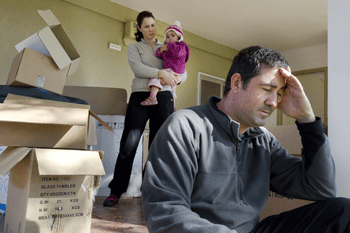
Thousands of low-income tenants have been plunged into “heat or eat” hardship as a result of the bedroom tax, a government-commissioned analysis of the policy’s impact reveals.
..
The study, published by the Department for Work and Pensions (DWP), finds that 60% of the 523,000 tenants affected have been unable to meet housing benefit shortfalls of between £14 and £22 a week in full.
Hard-pressed tenants are cutting back on food and energy, or running up debts with friends or high-credit lenders to try to meet rent payments, the report finds.
Although one in five claimants has registered an interest in downsizing, shortages of smaller properties mean just 4.5% of tenants had been able to move to a smaller home.
Four-fifths of claimants told researchers they were finding it “very” or “fairly” difficult to meet the shortfalls, and many said they would continue to spend less on household essentials over the next 12 months.
One social landlord told researchers: “Our customers (tenants) are in severe hardship through this reduction in housing benefit and many are needing vouchers for food banks after making rent payments.
“Customers are distraught and telling us they cannot cope and we are dealing with regular threats of suicide.”
Tenants told researchers that financial pressure caused by the bedroom tax mean that they struggled to afford school uniforms, or family swimming trips. They had cut down on going out, or having grandchildren round for a meal.
The work and pensions secretary, Iain Duncan Smith, defended the government’s package of housing benefit changes, saying that the DWP was “on track” to have saved over £6bn by next April.
A DWP spokesperson said that 4.5% of social tenants moving in the first six months of the bedroom tax policy was “a promising start”.
Social landlords reported rent arrears were up 16% since April 2013, although it was difficult to attribute this rise entirely to the bedroom tax.
The report notes that just 45 tenants were evicted as a direct result of the bedroom tax during the first six months of its implementation – over half of them by one unnamed social landlord.
However, more than 35% of tenants affected by the bedroom tax had been issued with formal eviction warning letters by autumn 2013. Social landlords predicted “widespread concern about potential future evictions”. Researchers Cambridge Centre for Housing and Planning Research and pollsters Ipsos Mori based their work on detailed interviews and surveys with claimants, social landlords and local authorities.
The report, which was published as the government undertook a major ministerial reshuffle this morning – covers the first six months of the bedroom tax after its introduction in April 2013.
Under the bedroom tax – formally known as the spare room subsidy – working age social tenants in receipt of housing benefit who are deemed to occupy more bedrooms than they need are subject to a cut in housing benefit.
Although ministers said the bedroom tax would help ease overcrowding, most landlords told researchers that the policy would have little effect. Forty-one per cent said they now had three-bed houses lying empty as a result of the bedroom tax.
reblogged

More Stories
Covid19 is here forever – unless we mend our selfish ways
A Corona credit crunch looms – get your cash out now?
Euphemisms of the Apocalypse #4 Green Growth